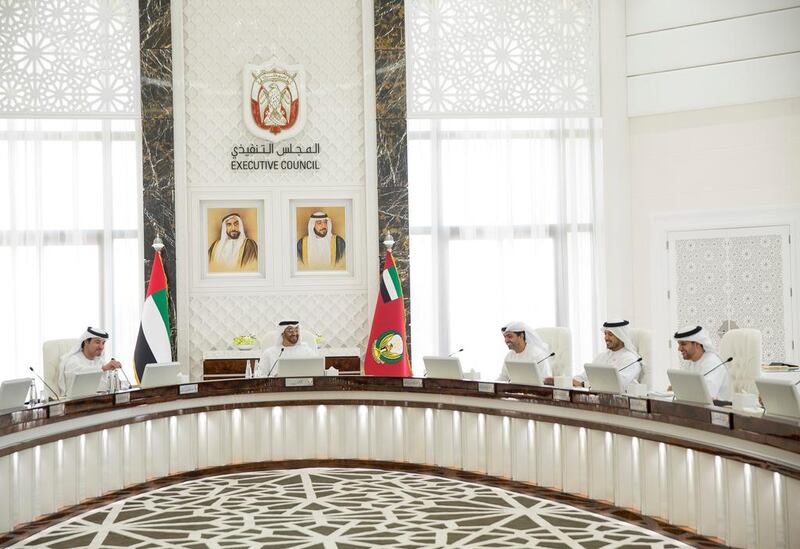ABU DHABI // Billions in development projects and the merger of three universities in the capital were approved by the Abu Dhabi Executive Council on Thursday.
The decision to unify Khalifa University, Masdar Institute and the Petroleum Institute was made during a meeting headed by Sheikh Mohammed bin Zayed, Crown Prince of Abu Dhabi, Deputy Supreme Commander of the Armed Forces and Chairman of the council.
The move is aimed at marshalling resources more efficiently while building on the universities’ achievements and setting the unified institute among the world’s best, the council said.
The council did not say when the merger would take effect and further details were not provided.
Faculty members have said they hope the decision leads to an improved educational structure in the country.
“This will the unite the country’s resources into one strong university where the young generation of the country will get the best education in the world,” said Dr Fahad Almaskari, a mechanical engineering professor at Petroleum Institute.
“It may be hard to start with, but it will have a long-lasting impact on the nation’s development, especially in the education sector.”
About 4,508 students will be affected by the decision. Masdar Institute, which focuses on advanced energy and sustainable technology, has 456 students from more than 50 countries, while science-focused Khalifa University has 1,875 students and Petroleum Institute has 2,177 students studying in different faculties of engineering.
Zubair Khan, an engineering technician at Petroleum Institute, said that there could be concerns on campus about the new development, but he hoped it would benefit students.
“The news was already in the air since many weeks, but no one was expecting that this would happen so soon,” he said.
“I sincerely hope that it will be a good decision for the institute and its students.”
Other projects include the disbursement of housing loans and the development of residential and business districts, schools, roads and infrastructure.
The council approved housing loans worth Dh2.3 billion for 1,250 Emiratis in Abu Dhabi, for building or completing homes in the emirate.
The awards of a Dh1bn business district project in Madinat Zayed and a Dh687 million residential project in Al Hayer, near Al Ain, were also approved. A total of 300 residential units and 30 land lots will be allocated for the Al Hayer project, which will also include road work, infrastructure and services.
The council said it had also approved the transfer of a Dh249m development project in Al Zahiya area that will involve that redesign Al Ferdaws and 10th streets, and the provision of pedestrian and bicycle lanes.
Car park areas and road lighting will be changed, and street entrances and exits surrounding the hotels, Abu Dhabi Mall and residential buildings will be improved or reconstructed.
“The project keeps pace with the growing urban development of Abu Dhabi City, in order to contribute to the provision of integrated solutions for this lively area, provide a safe environment for pedestrians, and improve traffic,” the council said.
Other road projects in Abu Dhabi were also given a green light. These include a Dh254m project in Al Shawamekh area to build a 28-kilometre internal network of lit roads, car parks and networks for rainwater drainage, telecommunications and sewerage.
In Baniyas East 11, a Dh160m project will include a 17.5km network of roads and 34.8km in sidewalks, as well as parking areas, lighting and drainage networks. And in an area referred to as Eastern basin 25, in Abu Dhabi city, a Dh146m infrastructure project will serve 400 residential and public lots.
The council said the projects were approved to help achieve the targets of the Abu Dhabi Plan and ensure a decent life for the community.
“The plan also seeks to establish integrated urban areas that fulfill the needs of the community, and provides it with a high quality of life, in order to guarantee social stability and suitable accommodation, in accordance with the highest specifications and standards.
Improvements will also be made to 140km of roads from Al Fayah to Al Razeen and Al Qua’a, at a cost of more than Dh377m. Roundabouts, sidewalks, lighting, rainwater drainage and fencing will be built, and the road will be upgraded to carry heavy trucks.
For Shakhbout City, a second and third cycle girls school with a capacity for 2,100 pupils has been approved in a Dh129m project.
And In Al Ain, three primary electricity transfer stations will be built for Dh190m to feed new development projects and improve the management of power demand. A total of 20km of electric cables and 12.5km in fiber-optic cables will be provided or extended, and existing compact stations will be reused in other parts of the city.
The council also reviewed the progress of the Louvre Abu Dhabi museum as well as Al Ain Zoo and Water Parks.
newsdesk@thenational.ae
*Additional reporting by Amna Khaishgi






